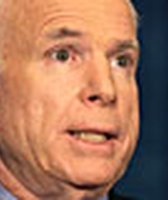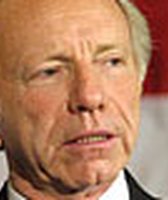Stand up for the facts!
Our only agenda is to publish the truth so you can be an informed participant in democracy.
We need your help.
I would like to contribute
Forecasting another market collapse?
The recent meltdown in the financial markets, and the massive government-led bailout it inspired, has made deregulation almost a dirty word. Seizing on the spirit of the times, Barack Obama is accusing John McCain of preparing to eliminate regulations governing the sale of health insurance, in a continuation of what Obama contends are the too-hands-off regulatory policies of the Bush administration.
"We’ve seen what Bush/McCain policies have done to our economy. Now, John McCain wants to do the same to our health care," an announcer intones in a new Obama campaign ad, called "Article," that was unveiled Sept. 22, 2008. "McCain just published an article praising Wall Street deregulation, said he’d reduce oversight of the health insurance industry, too. Just as we have done over the last decade in banking. Increasing costs and threatening coverage."
The magazine article mentioned in the ad is an opinion piece McCain wrote in the September/October edition of Contingencies , a magazine published by the American Academy of Actuaries devoted to insurance and financial service issues. Obama wrote an accompanying piece in the same issue.
We’ve already dealt with the McCain camp’s views on financial regulation in this item about former McCain adviser Phil Gramm , and this story that examined McCain's position on the bailout of insurance giant AIG.
Sign up for PolitiFact texts
On the issue of health insurance, the Obama ad focuses on a section of the McCain article dealing with expanding consumer choice in health care. McCain advocates allowing individuals to purchase health insurance from companies across state lines. Currently, states oversee the health care insurance market within their borders, a system of regulation that McCain and others say limits consumer choices and inflates prices.
"Opening up the health insurance market to more vigorous nationwide competition, as we have done over the last decade in banking, would provide more choices of innovative products less burdened by the worst excesses of state-based regulation," McCain wrote. "You should be able to buy your insurance from any willing provider – the state bureaucracies are no better than national ones."
McCain is adapting a health care proposal long championed by conservatives in Congress and by the Bush administration that would allow insurers to bypass state-imposed coverage mandates for certain types of treatments and procedures, such as diabetes care and cancer screenings. The theory behind these proposals is that by eliminating the need to comply with a tangle of state regulations, small businesses and consumers would be more likely to band together and better able to negotiate lower prices, and thus reduce the number of uninsured Americans. Several bills that would have permitted this passed the U.S. House when the GOP controlled the chamber, but they died in the more closely divided Senate.
Critics of such regulatory streamlining worry that it would destroy state-mandated consumer protections that include limiting how much and how often an employer can raise premiums when an employee gets sick, and eliminate state requirements on mental health and screenings such as those for cervical and breast cancers, leaving consumers at the mercy of insurers. (Health insurance generally is regulated by states, not the federal government, but the federal Employee Retirement Income Security Act of 1974, known as ERISA, does outline some requirements for employee benefit plans.)
So, there are two elements here.
First is the question of whether or not McCain wants to "reduce oversight of the health care industry." The answer largely hinges on how McCain would license insurance carriers to operate across state lines, and whether he would retain some of the existing rules while streamlining state regulations – complex but important details his campaign hasn’t provided. One scenario that Republicans considered in the Senate in 2006 would have allowed insurers to bypass state coverage mandates if they met certain minimum standards. Insurers who chose to offer such plans would have been required to offer at least one plan that matches the benefits offered to state employees of one of the five most populous states — California, Texas, New York, Florida and Illinois. Democrats blocked the proposal from being considered, so it’s unclear how McCain would have voted.
Experts say without more details, it’s difficult to predict an answer to the second element, which is whether or not such changes would "increase costs and threaten coverage." Cori Uccello, the American Academy of Actuaries’ senior health fellow, says if new cross-country insurance rules were made more favorable to people in poor health, for example, sicker individuals would migrate to those interstate plans and gradually force premiums to rise. The opposite could occur if the new market’s rules had less generous coverage requirements and primarily attracted healthier individuals. Uccello says applying the same rules to all interstate plans could avoid such disparities.
So it’s impossible to tell whether McCain’s plan would really drive up costs and threaten coverage, never mind unleash a calamity on the scale of what is currently sweeping through the financial sector. McCain certainly is on record supporting less state regulation of health insurance, which would reduce coverage mandates and put more of an onus on consumers to shop for the best deals. Whether this would result in more choice and lower prices, as McCain contends, depends on what kind of rules his administration would draft, and how insurers would respond. But lacking such details and the knowledge of how the market would react, it’s a stretch for Obama to suggest McCain is intent on taking a hands-off approach to health insurance. We rule his claim Half True.
Our Sources
Obama campaign ad,
"Article"
Contingencies,
"Better Care at Lower Cost for Every American,"
by John McCain, September/October, 2008
McCain campaign,
Health system reform
CQ Today, "House Passes Bill That Would Allow Insurers to Bypass State Coverage Mandates," by Kate Schuler, July 26, 2005
Browse the Truth-O-Meter
More by Adriel Bettelheim
Forecasting another market collapse?
Support independent fact-checking.
Become a member!
In a world of wild talk and fake news, help us stand up for the facts.











































